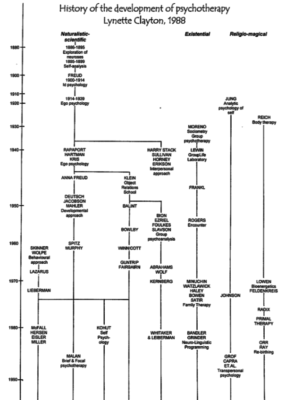I find Hillman a joy to listen to. This video leads to many others.
Why are psychological methods often known by the names their founders?
Freud, Moreno, Jung… methods are known by their founders.
This is because they are working in the realm of relationships. They are included in the science.
They are not working with things.
Marx is the same.
The objective thing they are working with is not objective in the way things are – at least things on the surface are objects.
In so far as we are part of such a modality we are part of a community around that person. We are part of a community of practice. A language community.
The Buddhists have lineage, so do psychologists but we don’t acknowledge that so easily.
It would be better to acknowledge our whakapapa in the psychological realms of our work in a more conscious way.
Later: Sunday, 7 January, 2018
Love that idea of our psychological whakapapa. Maybe there is a whakapapa of science too?
I think I’d like to research and rewrite the Moreno one. I think it is not so much existential as relational .
Coevolution, invention, creation of the psyche – the relational paradigm
There is a flow in the evolution process.
Grass had to exist before grazing animals could evolve, they in turn had to precede carnivores.
These examples perhaps are best expressed in the principle of the “next adjacent possible”.
A brief digression: I recently ran across a novel way to think about this question. In evolutionary theory, there’s a concept called the “adjacent possible,” coined by scientist Stuart Kauffman.
The “adjacent possible” refers to the change that’s available to you — i.e. adjacent, next door – versus the change that’s not.

From Stuart A. Kauffman — Reinventing The Sacred Amazon
The process is holistically connected to the mutual adaptations in each species. Grasses develop ways to survive grazing. Herbivores evolve capacity to run, and carnivores develop sharper teeth and claws.

This idea is sometimes captured with the phrase co-evolution (Wikipedia):
In biology, coevolution is “the change of a biological object triggered by the change of a related object.”[1] Coevolution can occur at many biological levels: it can be as microscopic as correlated mutations between amino acids in a protein, or as macroscopic as covarying traits between different species in an environment. Each party in a coevolutionary relationship exerts selective pressures on the other, thereby affecting each other’s evolution.
Earlier post exaptation, a related concept.
I’m imagining this whole process as envisage the world of the psyche. The changing nature of how we relate to our being. Everything from collective rituals, art, monks meditating in a cave, group therapy, psychoanalysis, conjoint family week and couple therapy.
The investigations above, summed up as:
- Adjacent possible
- Coevolution
- Exaptation
Imagine how these apply to the coevolution/invention/creation of the psyche.
(Why I say evolution/invention/creation is evident from this post about psyche this post about the nature of the psyche, about how it is not a thing, yet not nothing either, is relevant.)
Freud was before Jung. The idea of an unconscious and a method of working with it that was possible in the world was available to Freud as a medical clinician.
Moreno was in part a reaction to Freud. Group therapy and conjoint therapy was possible.
Moreno and Buber had found or invented an idea about the nature of the person being in the relationship.
Hendrix is pioneering the ice that being is relationship.
The relational paradigm is the now a niche that has opened, a shift in the culture and new ways of attending the the psyche are possible.
Moreno’s idea that this could well transform science is also on the cards as an I-Thou relationship with things is also possible according to Buber.
Psychological Eclecticism and Nothing
I recall being advised by my then supervisor, about 30 years ago, to look around for a psychotherapy modality that grabbed me and then to learn it thoroughly and not become prematurely eclectic. I followed that advice. Psychodrama was that modality for me and I am steeped in its traditions and have practiced it for decades and hope to do that for a few more.
However I have more than a passing familiarity with a some other fields of practice, I have a grasp of Archetypal Psychology and I am qualified in Imago Relationship Therapy. I have grappled with my multiple perspectives, and have written a paper about my tension with Imago for the AANZPA Psychodrama Journal: The Imago Affair. I’ve been thinking about this more of late.
My Tweets 2010-02-08
Tweets Follow

